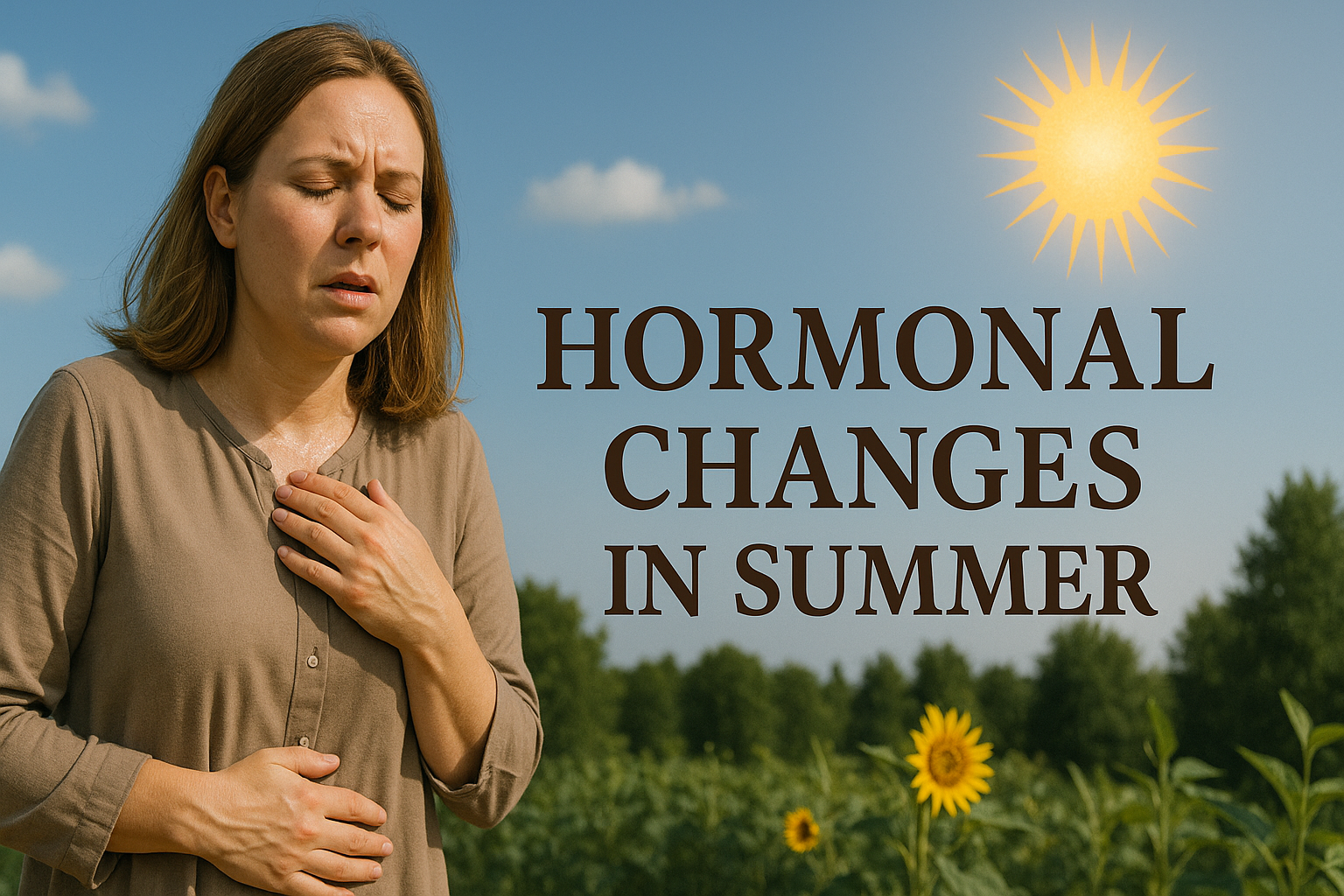Did you know the summer heat in Chicago does more than just make you sweat? Rising temperatures and increased sun exposure can trigger noticeable changes in your hormones, affecting everything from mood and energy levels to menstrual cycles. As an OB-GYN, I frequently hear patients express concerns about these seasonal shifts. Here’s a quick guide on why this happens and simple tips to keep your hormones balanced and your summer enjoyable.
Why Summer Can Throw Your Hormones Out of Whack
Summer is often associated with carefree days and relaxation, but the increased heat and sunlight can cause unexpected shifts in your hormonal balance. Rising temperatures lead your body to work overtime to maintain equilibrium, particularly affecting hormones like cortisol, estrogen, and progesterone. Higher cortisol levels—the hormone linked to stress—can spike during heatwaves, causing disruptions in mood, sleep patterns, and even menstrual regularity.
Additionally, longer daylight hours influence your circadian rhythm, impacting the delicate hormonal interplay that governs your internal clock. Any disturbance to your biological rhythm, such as irregular sleep caused by heat-induced discomfort, can further exacerbate hormonal imbalances. The result? You might feel more irritable, tired, or even notice changes in your cycle.
The Sun-Hormone Connection: Vitamin D and Your Mood
Sunshine boosts vitamin D production, a key hormone essential to bone health, immunity, and mental wellness. Chicagoans, who endure long, cloudy winters, typically experience a surge in vitamin D during the sunny summer months, positively impacting mood and energy levels. However, there’s a delicate balance to maintain: too little sun can trigger seasonal mood disorders, while excessive sun exposure can elevate inflammatory responses in sensitive individuals, occasionally leading to increased estrogen production.
If you’re sensitive to hormonal fluctuations, monitor your sun exposure. Aim for a healthy balance—typically about 15 to 20 minutes of direct sunlight daily. This simple practice can help regulate mood swings and support healthy hormonal levels, without triggering adverse effects.
Heat Waves and Menstrual Cycles: What’s the Link?
If you’ve noticed shifts in your menstrual cycle during summer, you’re not alone. Studies have suggested that extreme heat and humidity can impact menstrual regularity, increasing cramps, lengthening or shortening cycles, or even intensifying PMS symptoms. Heat-induced stress on the body may affect the delicate balance of estrogen and progesterone, two primary hormones guiding your cycle.
Women frequently report heavier or irregular periods during heatwaves due to increased fluid retention and circulation changes. Staying informed about your body’s seasonal reactions can help manage expectations, reducing anxiety or uncertainty. If your summer menstrual changes become particularly uncomfortable or concerning, reach out to your OB-GYN for personalized advice.
Hydration Matters: Dehydration and Hormonal Imbalance
One of the simplest, yet often overlooked, factors affecting hormonal balance in the summer is hydration. Dehydration doesn’t only cause headaches and fatigue—it also significantly impacts hormonal functions. For example, cortisol levels spike when your body senses dehydration stress, further disturbing hormonal harmony.
Proper hydration supports adrenal health, helps regulate cortisol, and even maintains estrogen and progesterone balance. Chicago’s summer temperatures can vary dramatically, so consistently drink water, particularly if spending extended periods outdoors. A good guideline is the “8×8” rule—eight glasses of eight ounces each daily—but adjust upward during hot or especially active days. Don’t underestimate the hormonal benefits of simply staying hydrated!
Cooling Down Stress: How Summer Anxiety Affects Your Hormones
While summer is idealized as a relaxed season, reality often differs—particularly in a bustling city like Chicago, where summer can be filled with increased social obligations, disrupted routines, and temperature-related discomfort. These factors can combine to heighten stress and anxiety, directly affecting hormone levels.
Cortisol, the “stress hormone,” plays a significant role in how you experience anxiety and stress. Increased cortisol disrupts sleep, mood stability, and even digestion. Over time, heightened cortisol can suppress other hormonal processes, leading to symptoms such as fatigue, irritability, irregular periods, and more.
Manage summer stress proactively through mindfulness techniques, relaxation exercises, or even just intentional downtime. Prioritize good sleep hygiene—maintain a consistent sleep schedule, use cooling methods such as fans or air conditioning, and limit screen time before bed to help lower cortisol levels and promote hormonal stability.
Your OB-GYN’s Tips for Keeping Hormones Happy All Summer
As your OB-GYN in Chicago, here are practical, evidence-based strategies to help you maintain hormonal balance throughout the summer:
1. Prioritize Hydration:
Drink plenty of water and eat water-rich fruits and vegetables like cucumbers, watermelon, and berries. Stay mindful of hydration especially during Chicago’s heatwaves.
2. Seek Balanced Sun Exposure:
Enjoy moderate sun exposure early or late in the day to boost vitamin D without overstimulating hormone-sensitive processes.
3. Maintain Regular Sleep Patterns:
Aim for consistency in your sleep routine, even on weekends. Sleep in a cool, dark, and quiet environment to reduce disturbances in your circadian rhythm.
4. Watch Your Diet:
Eating hormone-friendly foods—rich in fiber, omega-3 fatty acids, lean proteins, and fresh vegetables—can support hormonal regulation. Avoid excess sugar, caffeine, and alcohol, which can exacerbate hormonal swings, particularly in hot weather.
5. Incorporate Stress-Reduction Techniques:
Activities such as yoga, gentle exercise, meditation, or simply quiet reading outdoors can help manage stress levels, improving overall hormonal health.
6. Consult Your OB-GYN:
Remember, individual hormonal responses can vary widely. If you experience significant shifts in mood, cycle irregularities, or any hormonal concerns during summer months, don’t hesitate to consult your healthcare provider. A proactive approach ensures you can fully enjoy the vibrant Chicago summer without unnecessary hormonal disruptions.
In summary, summer in Chicago doesn’t have to mean hormonal havoc. Awareness and proactive care can keep your hormonal health optimized, allowing you to enjoy the warmer months fully. By understanding how temperature, sunlight, hydration, and stress can impact your hormones, you empower yourself with the knowledge to navigate summer with ease. If you have specific questions or notice concerning symptoms, reach out to schedule an appointment—we’re always here to help you stay hormonally happy, healthy, and balanced.



